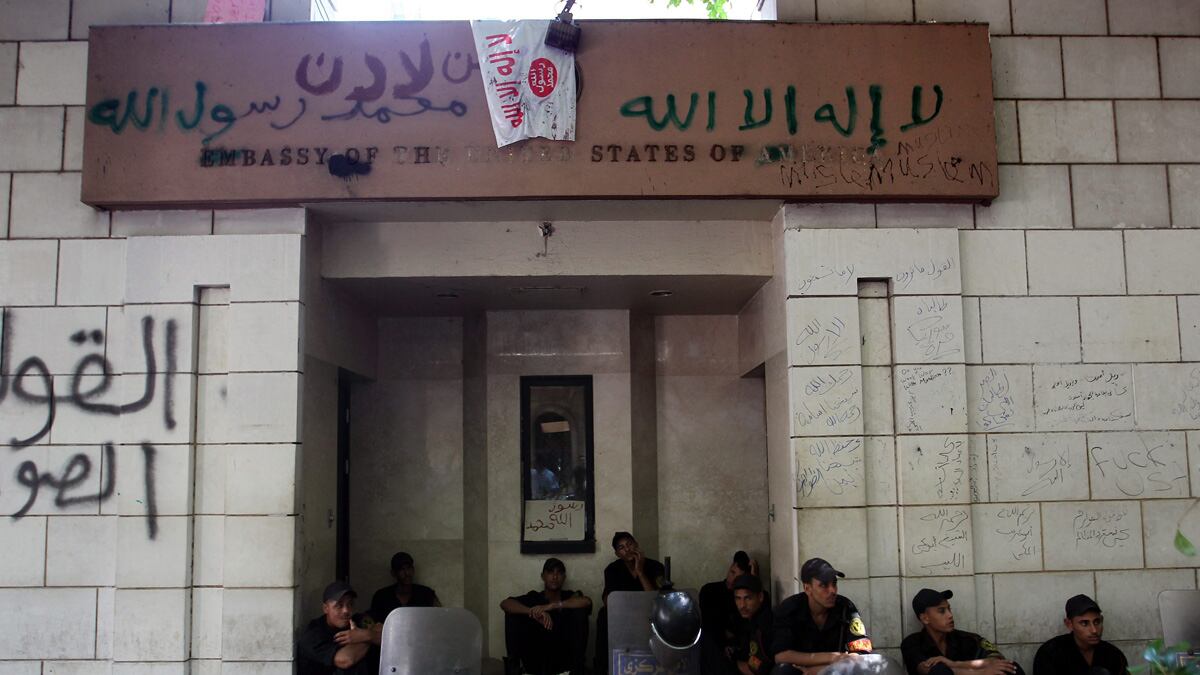Protests against a poorly produced but perfectly targeted video critical of Islam continue to spread. While they should taper off in the coming days, we can already identify short-term and potentially strategic impacts from this latest cycle of protest, violence, and tragedy in the Middle East.

The protests demonstrate yet again the growing power of individual actors nursing a sense of grievance achieving regional if not global significance, using weapons in some cases, but primarily digital images and communication technology.
This is where the new Middle East meets the modern, interconnected world.
But if the nexus of social and traditional media can inspire as we saw last year in Tahrir Square, it can also inflame. Technologies have the ability to bring us together, but they are also being employed to drive us apart.
Through the Internet, bit players on all sides can find each other, play off each other, and use each other to build what has been termed a “grievance industry.” This dynamic, once out of the bottle, is hard to contain.
“Actors in the region have lots of incentive to gin them up and lots of material to work with,” cautions Tamara Wittes, director of the Brookings Institution Saban Center for Middle East Policy. “Once anti-American protests start in on some supposed grievance, our ability to tamp down tensions is very limited.”
As we saw, governments were caught off-guard. Leaders (and political candidates) struggled to keep up with rapidly developing events and balance short-term domestic politics and long-term foreign policies. We saw this most significantly with Egypt. Anger over the video coalesced first there, arguably the most “connected” country in the Middle East, after clips were shown on an Egyptian television network.
Sensing trouble, the American Embassy in Cairo issued a statement prior to the protests that said in part, “Respect for religious beliefs is a cornerstone of American democracy. We firmly reject the actions by those who abuse the universal right of free speech to hurt the religious beliefs of others.”
Republican candidate Mitt Romney misconstrued the sequence of events and wrongly accused the embassy staff of “apologizing for the right of free speech” in the face of violent protests.
Nevertheless, fearing an exposed political flank, the Obama administration disavowed the original embassy statement. State Department spokeswoman Victoria Nuland said, “The message was unbalanced, the words were mischosen, and they were not clearly comprehensible to all audiences.”
But trying to find the perfect formulation that threads the needle between very different perceptions in the United States and overseas limited its ability to influence the newly empowered Arab street and temper rising anti-Americanism.
As violent protests spread throughout the Islamic world, Secretary of State Hillary Clinton issued a sharp denunciation of the video, saying, “It appears to have a deeply cynical purpose: to denigrate a great religion and to provoke rage.” While adding a vigorous defense of freedom of expression, her message landed a relatively short distance from where the American Embassy in Cairo started.
Egyptian President Mohamed Morsi found himself with the same quandary: how to effectively straddle competing domestic and international priorities. Initially identifying with the protesters’ outrage over the video, Morsi was slow to respond to the subsequent violence in Cairo and Benghazi, Libya, which a Muslim Brotherhood leader euphemistically termed “revolutionary fluidity.” Following a blunt conversation with President Obama, he criticized the violent protests and vowed that Egypt would meet its international obligations to protect all diplomatic posts.
But the United States expected more of Morsi given the fact that Egypt remains one of the leading recipients of U.S. assistance and badly needs bilateral and international help to rebuild its battered economy.
Obama betrayed his frustration in an interview with Telemundo, when he said of Egypt, “I don’t think we would consider them an ally, but we don’t consider them an enemy.”
While the president was technically wrong—Egypt is a major non-NATO ally—Obama’s off-the cuff comment was nonetheless remarkable. Only 20 months ago, Obama turned decades of U.S. policy on its head, identified with the aspirations of the Egyptian people, and helped push Hosni Mubarak from power. President Morsi is an early product of Egypt’s democratic transition.
Obama’s comment does not reflect buyer’s remorse, but it offers a clear indication of the uncertain state of U.S.-Egyptian relations.
The downgrade probably scores short-term political points for both leaders. Morsi has little use for the term ally right now, since it is closely associated with the Mubarak era. But if the decline continues, it could undermine significant priorities that are likely to dominate Obama’s foreign-policy agenda should he be reelected—Iran, Syria, and the resumption of Israeli-Palestinian negotiations.
On these issues, Morsi has been constructive. In Tehran, he forcefully declared, just as Obama did, that Bashar al-Assad has lost his legitimacy and criticized Iran for supporting him. Morsi has pledged to respect Egypt’s peace treaty with Israel. Without Egypt’s help, there is little chance of achieving a peace agreement.
Despite his familiarity with the United States, Morsi for political reasons is unlikely to develop a close relationship with his American counterpart. But there should be sufficient common ground to enable at the very least a businesslike approach.
The White House needs to reinforce its support for Egypt at home. The images of protesters in Cairo breaching the embassy grounds, shredding the American flag, and replacing it with an Islamist flag, together with Obama’s verbal downgrade, may impel some in Congress to consider reducing the level of U.S. assistance to Egypt. Given the centrality of Egypt to the future of the Middle East, this makes no strategic sense.
Having already suffered four casualties this week in Benghazi and considerable damage across the region, the United States should not risk another loss in the aftermath—its strategic partnership with the new Egypt.






